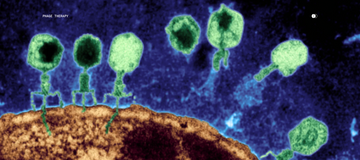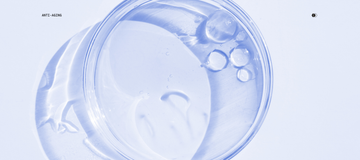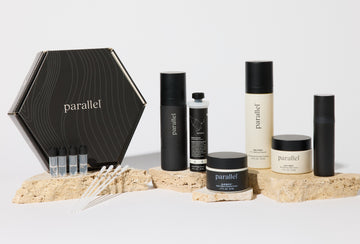Why Your Skin Microbiome Holds the Key to Skin Aging on a Molecular Level
by Parallel Health Team
Here's something that might blow your mind: right now, as you're reading this, trillions of microscopic organisms are quietly working on your skin's surface, essentially deciding how you'll age. Not your genes, not your skincare routine—though those matter, too—but this invisible ecosystem called your skin microbiome.
We're living through a fascinating shift in how we understand skin health. For decades, the beauty industry has been obsessed with the war on aging—attacking, stripping, exfoliating. But what if we've been fighting the wrong battle entirely?
The Discovery That Has Changed Everything
The skin microbiome isn't just on your skin; it's fundamentally reshaping how your skin functions. Think of it as your body's most sophisticated smart home system, constantly monitoring threats, maintaining optimal conditions, and coordinating repairs. When this system is thriving, your skin ages like a fine wine. When it's disrupted? Well, that's when things get interesting—and not in a good way.
Recent longitudinal studies tracking women across five decades revealed something remarkable: skin bacterial diversity increases at all skin sites with age, but only specific bacterial genera—Lactobacillus and Cutibacterium—showed significant decreases across all areas. Your microbiome is literally evolving as you age, and understanding this evolution is crucial for healthy aging.
But here's where it gets really fascinating: researchers discovered a direct relationship between microbiome diversity and crow's feet wrinkles—the more diverse your microbial community, the more pronounced these aging markers become. Before you panic, this isn't necessarily bad news. It's actually giving us unprecedented insight into the aging process itself.
The Aging Algorithm Written in Bacteria
Your skin doesn't age in isolation—it ages as part of an intricate biological network. The concept of "inflammaging" explains how microbial shifts seen with aging can accelerate age-related skin changes through chronic low-grade inflammation. It's like your skin is running outdated software that's causing system-wide glitches.
Environmental stressors, harsh products, and lifestyle factors don't just damage your skin—they rewrite your microbial code. UV radiation generates reactive oxygen species that affect DNA and decrease protein tyrosine phosphatases, contributing to photooxidative skin aging through altered microbiome patterns. Essentially, sun damage isn't just about what you can see on the surface; it's about the invisible community that determines how resilient your skin will be tomorrow.
The Microbiome Revolution in Skincare
This is where things get exciting. Instead of fighting against your skin's natural biology, we're learning to work with it. The emerging field of microbiome-supportive skincare isn't just another trend—it's a fundamental paradigm shift based on solid science.
Bacteriophages represent one of the most precise tools in the microbiome toolkit. These naturally occurring nano-microbes specifically target harmful bacteria while leaving beneficial bacteria untouched. Clinical applications of phage therapy in skincare are showing remarkable promise for supporting inflammatory skin conditions and aging with surgical precision at the microbial level.
Prebiotics function as precision nutrition for your beneficial bacteria. They're not feeding random microbes; they're selectively nourishing the species that maintain skin health and resilience. Think of them as probiotics' favorite meal, helping the good guys outcompete the troublemakers.
Probiotics in skincare introduce live beneficial bacteria directly where they're needed. Clinical evidence shows topical probiotic applications can enhance natural defense barriers and produce antimicrobial peptides that eliminate pathogens while reducing inflammation. It's like giving your skin's ecosystem a strategic reinforcement of the right kind of backup.
Postbiotics are the bioactive metabolites these beneficial bacteria produce—essentially, the beneficial byproducts of a healthy microbiome. Some postbiotic peptides have been shown to increase collagen and elastin production, leading to firmer, more youthful-looking skin. It's skincare at the molecular level.
The Inside-Out Connection
Here's something the beauty industry is just beginning to grapple with: your gut microbiome and skin microbiome are in constant communication through what researchers call the gut-skin axis. What you eat, your stress levels, even your sleep patterns are directly influencing the microbial communities on your skin.
This means the most effective anti-aging strategies aren't just topical—they're systemic. Supporting your internal microbiome through targeted nutrition and lifestyle choices creates a foundation for skin health that no amount of external products can match.
Beyond Beauty: Precision Microbiome Care
We're moving toward an era of precision skincare where your individual microbial signature determines your optimal treatment protocol. Recent studies examining the "skin interactome"—the integration of genome, microbiome, and exposome—suggest this holistic approach plays a significant role in skin aging and health.
This isn't about one-size-fits-all solutions. It's about understanding that your skin's needs are as unique as your fingerprint, determined by factors ranging from your genetics to your geography to your daily habits.
The Future Is Here
The brands leading this revolution aren't just adding probiotics to existing formulas and calling it innovation. They're fundamentally rethinking skincare from the ground up, designing products that support rather than disrupt your skin's natural ecology.
Clinical trials are demonstrating that microbiome-supportive products can improve skin barrier function, reduce inflammation, and enhance the appearance of various skin concerns, from acne to eczema to age-related changes. We're not just talking about better moisturizers—we're talking about skincare that works at the level of biological systems.
What This Means for You
The next time you look in the mirror, remember: you're not just seeing skin. You're seeing the result of trillions of microscopic interactions, each one contributing to how you age. The question isn't whether you'll age—it's whether you'll age in partnership with your skin's natural wisdom or in spite of it.
The science is clear: supporting your skin microbiome isn't just skincare—it's healthcare. It's about recognizing that beautiful, resilient skin isn't the result of warfare against aging, but collaboration with the biological systems that have been protecting and healing human skin for millennia.
References
-
Shibagaki, N., et al. (2021). "Aging-Associated Changes in the Adult Human Skin Microbiome and the Host Factors that Affect Skin Microbiome Composition." Journal of Investigative Dermatology, DOI: 10.1016/j.jid.2021.11.026
-
Woo, Y.R., & Kim, H.S. (2024). "Interaction between the microbiota and the skin barrier in aging skin: a comprehensive review." Frontiers in Physiology, 15:1322205
-
Myers, T., et al. (2024). "A multi-study analysis enables identification of potential microbial features associated with skin aging signs." Frontiers in Aging, 4:1304705
-
Zheng, Y., et al. (2020). "New Insights Into the Skin Microbial Communities and Skin Aging." Frontiers in Microbiology, PMC7649423
-
Sinha, S., et al. (2022). "Topical Probiotics: More Than a Skin Deep." Pharmaceutics, PMC8955881
-
Li, W., et al. (2023). "The Role of Probiotics in Skin Health and Related Gut–Skin Axis: A Review." Nutrients, PMC10385652




























